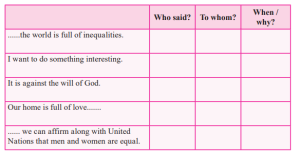Nature Created Man and Woman as Equals
English Workshop
1. (A) Find from the lesson words / phrases that mean the following.
Answer:
(a) Colours – hues
(b) A person who writes for newspapers/magazines – journalist
(c) Make a difference between – discriminate
(d) Cry over – lament over
(e) Explain in detail – throw light on
(f) Abilities and qualities – potential
(g) Same availability – equal access
(h) A person who brings about a social/political change – activist
(B) Pick out five Compound words from the lesson.
Answer:
- Household
- Sweet-smelling
- Social-worker
- Mountain range
- Woman’s rights
2. Answer in your own words.
(a) Read and write down 5 points which prove that Tomba (Lanthoi’s father) firmly believes in gender equality.
Answer:
- Tomba supports his wife’s professional career and does not restrict her to household duties.
- He shares household chores like cooking, washing, and cleaning equally with his wife.
- He is proud of both his daughters and son, treating them equally.
- He is a social worker advocating for women’s rights and equality.
- He openly speaks about the injustice done to women and encourages his daughter to understand the importance of gender equality.
(b) In what ways is Ashangbi different from other women of her community?
Answer:
- She is a journalist and women’s rights activist, actively working for equality.
- She writes articles to promote gender equality and raise awareness.
- She believes that men and women should enjoy equal opportunities.
- Unlike many other women in her community, she is independent and professionally successful.
- She encourages her daughter to be confident and aware of gender rights.
(c) What are the provisions in the Declaration of the United Nations, to ensure equality of men and women?
Answer:
- Equal access to basic social services, including health and education.
- Equal participation in political and economic decision-making.
- Equal reward for equal work.
- Elimination of discrimination and violence against women.
3. Who said to whom and when / why?
Answer:
| Statement | Who said? | To whom? | When / why? |
|---|---|---|---|
| ……the world is full of inequalities. | Possibly a social reformer, leader, or writer | General public or a specific audience | To highlight social injustices and the need for equality |
| I want to do something interesting. | Any character from a story or a person in real life | A friend, mentor, or family member | When expressing a desire for adventure or change |
| It is against the will of God. | Religious leaders, priests, or a character in a moral story | Followers or a congregation | To emphasize moral or religious values |
| Our home is full of love……. | A family member or a character in a story | Another family member or a guest | To express warmth and affection in a household |
| ……. we can affirm along with United Nations that men and women are equal. | A leader, activist, or UN representative | Public, audience, or world leaders | To advocate for gender equality and human rights |
4. We have studied in previous classes that Pronouns are words used instead of Nouns.
We also know about Personal Pronouns like I, you, he, she, my, your, his, her, they etc.
There are other words also which are used in place of nouns.
(i) This, that, these, those point to some noun.
For example: ‘This is a kingfisher.’ ‘Those are herons.’ Such Pronouns are called
Demonstrative Pronouns.
(ii) Some pronouns not only replace nouns, but also connect two sentences.
For example: ‘Biology is a science. It studies living organisms.’
Biology is a science which / that studies living organisms.
Some other such pronouns are who, whose, whom etc.
They are called Relative Pronouns.
(iii) Some pronouns are used to ask questions.
For example:
What is your name?
Which is your coat?
Who is your coach?
The underlined words are Interrogative Pronouns. Underline the Pronouns
in the following sentences and name their types.
Answer:
(1) What do you want to do? → Interrogative Pronoun
(2) It is because of your father that I feel no inequality. → Personal Pronouns
(3) This is what your topic means. → Demonstrative Pronoun
(4) She is fascinated by the small trail, which winds up the mountain. → Relative Pronoun
5. Read the following lines. Imagine it is the beginning of an instance you have experienced. Complete the incident using your imagination. Give it a positive ending.
I had often noticed that in my neighbour’s family, the son was greatly pampered, but the daughter was treated unfairly. I could not bear this. So one day I decided to ……………………. Continue the write-up, with your own ideas, in about 12 – 15 lines
Answer:
I had often noticed that in my neighbour’s family, the son was greatly pampered, but the daughter was treated unfairly. I could not bear this. So one day I decided to talk to my friend, who was the daughter in that family. She told me that she wanted to study and play like her brother, but she was always expected to do household chores.
I decided to speak to her parents. At first, they did not agree with me, but I explained to them how both boys and girls have equal rights. I also showed them examples of successful women in different fields. Slowly, they understood my point. They started treating their daughter with more love and gave her the same opportunities as their son.
A few years later, I was happy to see my friend excelling in her studies and fulfilling her dreams. I realized that a small effort can bring a big change in society!


Leave a Reply